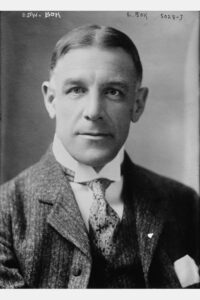
The Young Man in Business
Now, as every young man naturally desires to make a business successful, it is plain from the above statement that something is lacking: the young men’s opportunities or capabilities. No one conversant with the business life of any of our large cities can, it seems to me, even for a single moment, doubt the existence of good chances for young men. Take any large city as a fair example: New York, Boston, Philadelphia, or Chicago, and in each instance, there exist more opportunities than there are young men capable of embracing them. The demand is far more than the supply. Trust positions are constantly begging for the right kind of young men to fill them. But such men are not familiar, or, if they are, they have a most unfortunate way of hiding their light under a bushel, so much so that businessmen cannot see even a glimmer of its rays. Let a position of any fundamental importance be open, and finding anyone to fill it satisfactorily is the most challenging problem.
Businessmen are constantly going through this experience. Young men are desired in the great majority of positions because of their progressive ‘ideas and capacity to endure work; in fact, “young blood,” as it is called, is preferred in nine positions out of every ten nowadays. The chances for business success for any young man are not wanting. The opportunities exist, plenty of them. The trouble is that the average young man of today is incapable of filling them, or, if he is not precisely incapable (I gladly give him the benefit of the doubt), he is unwilling to fill them, which is even worse. That exception can be brought up to argue, I know, but I am dealing with the many, not with the few. The average young man in business today is nothing more nor less than a plodder—a mere automaton. He is at his office at eight or nine o’clock in the morning, faithful in his duties, goes to luncheon at twelve, gets back at one, takes up whatever he is told to do until five, and then goes home. His work for the day is done. One day is the same to him as another; he has a specific routine of duties, and he does them day in and day out, month in and month out. His duties are regulated by the clock. As that points, so he points. Verily, it is true of him that he is the same yesterday, today, and forever. No particular fault can be found in his work. Given a specific piece of work to do, he does it just as a machine would.
Read or download Book
Edward William Bok
Edward William Bok (born Eduard Willem Gerard Cesar Hidde Bok) (October 9, 1863 – January 9, 1930) was a Dutch-born American editor and Pulitzer Prize-winning author.
Biography
He was the Ladies’ Home Journal editor for 30 years (1889–1919). He also distributed popular home-building plans and created Bok Tower Gardens in central Florida. Bok was born to a wealthy, prominent family in Den Helder, Netherlands. After his father lost most of his wealth due to bad investment decisions, the family immigrated to Brooklyn, New York, when Edward was six. In Brooklyn, he washed the windows of a bakery shop after school to help support his family. His family was so poor that he used to go into the street with a basket every day and collect stray bits of coal that had fallen in the gutter where the coal wagons had delivered fuel. By the time Bok was in his early teens, he was required to quit school to aid his family with financial support.
His first full-time job in 1876 was as an office boy with the Western Union Telegraph Company. In 1882, Bok began work with Henry Holt and Company as a stenographer while also taking classes in the evenings. In 1884, he accepted an offer from Charles Scribner’s Sons to become its advertising manager. From 1884 until 1887, Bok was the editor of The Brooklyn Magazine, and in 1886, he founded the Bok Syndicate Press, “the country’s third syndicate with 137 newspapers subscribed”. After moving to Philadelphia in 1889, he obtained the Ladies’ Home Journal editorship when its founder and editor, Louisa Knapp Curtis, stepped down to a less intense role at the famous, nationally circulated publication. It was published by Cyrus Curtis, an established publishing empire that included many newspapers and magazines.
In 1896, Bok married Mary L. Curtis, the daughter of Louisa and Cyrus Curtis. She shared her family’s interest in music, cultural activities, and philanthropy and was active in social circles. Shortly before his marriage, he published an advice book for young men. He noted, among other things, that “A man who truly loves his mother, wife, sister or sweetheart never tells a story which lowers her sex in the eyes of others.” During his editorship, the Journal became the first magazine in the world to have one million subscribers. It became very influential among readers by featuring informative and progressive ideas in its articles. The magazine focused on the social issues of the day. When Bok’s autobiography, The Americanization of Edward Bok, appeared in 1920 and later received a Pulitzer Prize, the writer H. L. Mencken reviewed it with an interest based on long acquaintance with the magazine.






